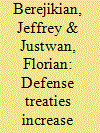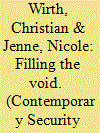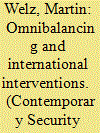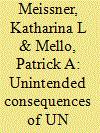|
|
|
Sort Order |
|
|
|
Items / Page
|
|
|
|
|
|
|
| Srl | Item |
| 1 |
ID:
189270


|
|
|
|
|
| Summary/Abstract |
Do security guarantees affect people's willingness to spend their country's “blood and treasure” in a military crisis? Recent research finds that international legal commitments reshape domestic policy preferences. However, the focus of that scholarship is traditionally on issues such as human rights that define a society's normative obligations. In this study, we deploy two original survey experiments in the United States describing a potential military crisis on the Korean peninsula. We find that increasing the salience of the 1953 agreement between Washington and Seoul increases support for military action and that individuals become both more tolerant of U.S. military deaths and North Korean civilian casualties. In addition, the breadth of these effects increases when individuals are provided more detail about the agreement. These results extend the analysis of international law and domestic preferences into the domain of national security politics.
|
|
|
|
|
|
|
|
|
|
|
|
|
|
|
|
| 2 |
ID:
189267


|
|
|
|
|
| Summary/Abstract |
Thirty years after the downfall of the Soviet-led communist bloc, the United States-led liberal international order is seen as coming to an end. Policymakers have converged on the need to safeguard the “rules-based order” across the newly coined “Indo-Pacific” region. However, policy and scholarly debates lack clarity about what exactly is to be preserved, and why the terms of the “rules-based order” and the “Indo-Pacific” have rapidly found their way into policy debates despite their contested meaning. Analyzing developments in regional multilateralism, we find that mainstream discourses purport static conceptions of order, which are often conflated with United States-centered trans-Pacific alliance relationships. The ensuing problem of order stems in large part from the fact that multilateral projects for building alternate orders, undertaken since the early 1990s, have remained far below their potential. We conclude that emerging forms of multilateral cooperation across the enlarged “Indo-Pacific” region have partially filled this void.
|
|
|
|
|
|
|
|
|
|
|
|
|
|
|
|
| 3 |
ID:
189271


|
|
|
|
|
| Summary/Abstract |
The question of how to deter sub-conventional activities—characterized by a limited role for the use of force—is one of the biggest puzzles in security studies. A way forward might be to use an enduring rivalry conflict management framework and to focus on findings from criminology. As the case study of 56 Estonian airspace violations suggests, executing sub-conventional deterrence is not an easy task to achieve. NATO’s deterrence success remains elusive, because there is no consistency in responding to these violations and no meaningful punishment. Yet many changes in frequency, intensity, and volatility of Russian intrusions over the last two decades indicate that a successful dissuasion, if not de-escalation, is still possible. To achieve that, NATO needs to improve information transmission, define its deterrence goals more narrowly, impose group-level costs, and implement dynamic deterrence mechanisms offering alternative modes of behavior.
|
|
|
|
|
|
|
|
|
|
|
|
|
|
|
|
| 4 |
ID:
189272


|
|
|
|
|
| Summary/Abstract |
This article studies why authoritarian states participate in international interventions. Troop contributions of such states indicate the support of authoritarian leaders for a liberal-cosmopolitan order that entails the protection of human rights internationally, while they deny such rights to their own citizens. I focus on the decisions of Chad’s long-term president Idriss Déby Itno to take an active stance in various international interventions. The analysis builds on the theory of omnibalancing, which holds that authoritarian leaders balance external and internal threats to ensure their survival. I demonstrate how Déby used troop deployment as part of his omnibalancing strategy. It allowed him to stay in power until his death in 2021 and made Chad’s democratization unlikely. For Déby’s omnibalancing not only quelled the domestic opposition and silenced international critique against the authoritarian rule, but also contributed to the securitization of the state.
|
|
|
|
|
|
|
|
|
|
|
|
|
|
|
|
| 5 |
ID:
189269


|
|
|
|
|
| Summary/Abstract |
Russia led a key Cold War alliance and is now at the forefront of debates about major power realignments. Yet Russia’s own conceptualization of alliances in the post-Soviet era has received scant attention. How do Russian policymakers and academics view Russia’s post-Cold War alliances: Are they obsolete, or are they still used for cultivating strategic relationships? We examine the Russian conceptualization of alliances through a systematic study of Russian policy documents and academic debates between 1991 and 2019. We find that traditional alliances are considered ineffective and defense commitments have declined. However, we challenge claims that alliances are obsolete and that alignments/multivectorism have replaced them. Russian regional alliances are cultivated for new purposes and coexist with various other institutional forms. We conceptually map Russia’s close relationships and argue that alliance scholarship needs to move away from a single entity focus toward conceptualizations based on institutional choices.
|
|
|
|
|
|
|
|
|
|
|
|
|
|
|
|
| 6 |
ID:
189268


|
|
|
|
|
| Summary/Abstract |
Sanctions are widely used foreign policy tools in reaction to crises in world politics. Accordingly, literature on sanction effectiveness—their intended consequences—is abundant. Yet, fewer studies address the unintended consequences of restrictive measures. This is remarkable given that negative externalities are well documented. Our article explores this phenomenon by asking under which conditions sanctions yield negative externalities. We develop a theoretical conceptualization and explanatory framework for studying the unintended consequences of UN sanctions. Empirically, we draw on data from the rich, but scarcely used Targeted Sanctions Consortium and apply qualitative comparative analysis (QCA) to examine negative externalities of UN sanctions, complemented by illustrations from the cases Haiti and North Korea. The results document the existence of multiple pathways toward unintended consequences, highlighting the negative impact of comprehensive and long-lasting sanctions, as well as the ability of autocratic targets with economic means to persist unscathed from sanctions.
|
|
|
|
|
|
|
|
|
|
|
|
|
|
|
|
|
|
|
|
|